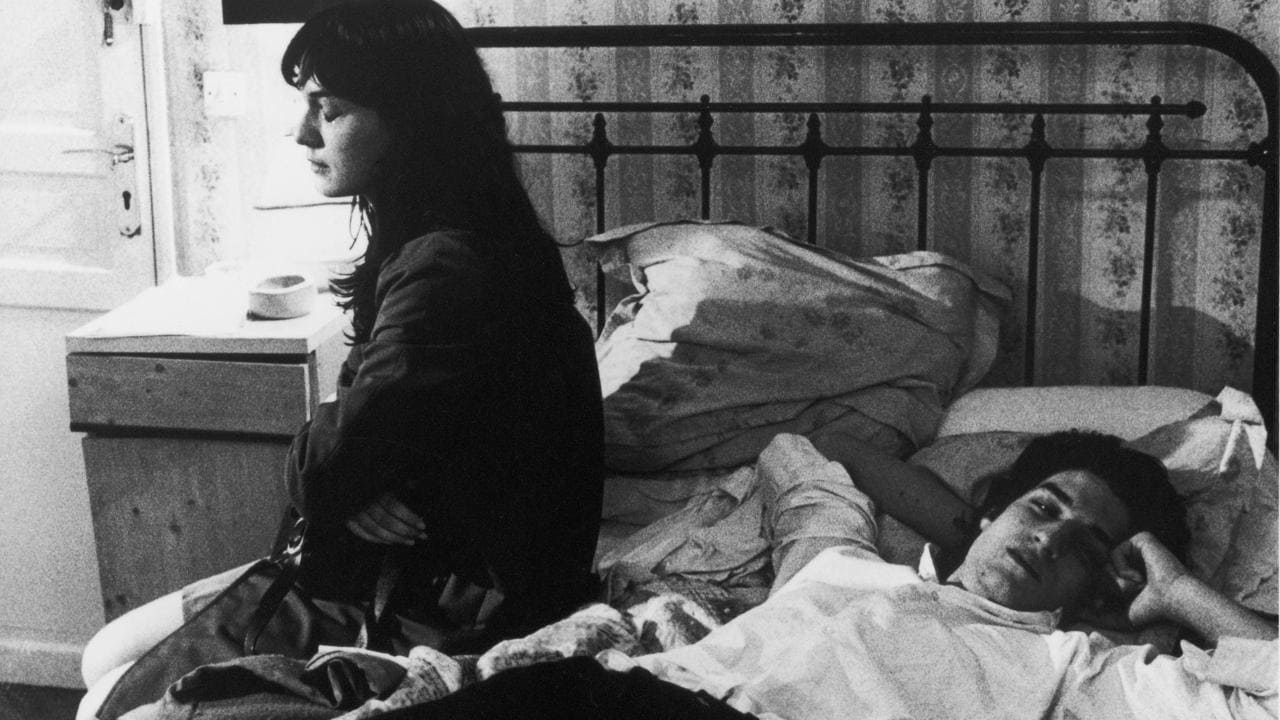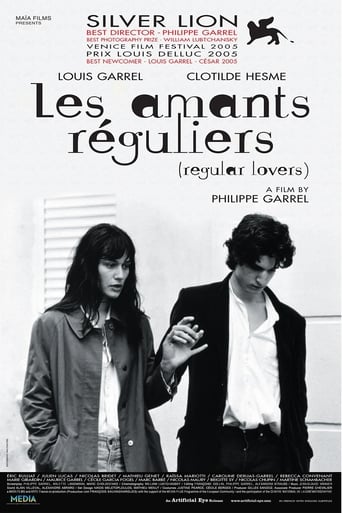

Although I seem to have had higher expectations than I thought, the movie is super entertaining.
... View MoreI enjoyed watching this film and would recommend other to give it a try , (as I am) but this movie, although enjoyable to watch due to the better than average acting fails to add anything new to its storyline that is all too familiar to these types of movies.
... View MoreGreat example of an old-fashioned, pure-at-heart escapist event movie that doesn't pretend to be anything that it's not and has boat loads of fun being its own ludicrous self.
... View MoreStrong acting helps the film overcome an uncertain premise and create characters that hold our attention absolutely.
... View MoreThis movie by Director Philippe Garrel is really hard to watch. I know this movie got a lot of praise from other critics, but in my opinion, it's not for any regular movie lovers. It's not entertaining enough to get people to watch 3 hours of it. It's so drawn out and so long to watch. It's 183 min for goodness sakes! 3 hours of a lot of boring scenes and few enjoying sequences and this isn't the Director Cut. This is the normal movie. Honestly, in my opinion, they could have cut some of the scenes down a bit. Rewrite it and have fewer scenes. The story takes forever to get started. A group of Parisian students find themselves caught up in the chaotic events of May '68 where students and workers strikes and almost gave France a civil war, or revolution. When the strikes fail, the young man François (Louie Garrel) and his clique of friends, experience the aftermath of the events and grapple with their attempts to understand what has just occurred and move on after it. By having his son play Francois, director Philippe Garrel is using him as a memento mori as a way to relive May 1968, through him. It seems to me, that Philippe wants to relive the Bohemia Nouvelle Vague hippie culture again. I hate the movie for trying to make the police look like fascists and the revolutionaries as pacifist poets. It's truly not like that. May 1968 strikes honestly hurt France economy as some of the protesters were anarchist and Stalinist. If we study Russia's history. Communist is just as bad as capitalism. After the strikes, the young adults choice to make love and art. This is where the movie get kinda boring. They talk while taking drugs. It's like watching two people mumbles and grunts follow with a few lines there and now. The action disappears and we are left with people talking a bit, stare, talking more a bit, stare, and then more talking. Once again, half of the stuff they talk about isn't need in the film. In no way, does it move the plot forward. It felt like a lot of filler scenes as if the Director took a smoke break, and left the camera running. The movie seem to suffer from a lot of audio problems. Some of the scenes where they are talking you can hear the microphone brushing upon something, deep breathing sounds or uneven audio tones. They are quiet one minute and then the other minute. Loud. The scenes are so short, it cuts like crazy. The movie has a fondness for cutting from mid-scene to mid-scene and a few primitive dream sequences notwithstanding. Francois takes part in the French revolutions of 1789 and 1848 in his dreams, but it's no way helps him step up another revolution. It's bothersome to have dream scenes and it goes nowhere. I did like William Lubtchansky's grainy, high-contrast black-and-white cinematography. The movie truly look like a student art film. The movie feels so art house film that I was afraid the movie would end up with words 'Fin'. It's like watching Bernardo Bertolucci 'Dreamers' (2003 film) without the sex and nudity. Instead of bright colors, we get none. The film's subject matter and casting mirrors that of Bertolucci, but this movie lacks any entertaining value. I did laugh at one point, one of Garrel's draft-dodging rebels tries to set fire to the French flag, and we see the whole awkward process. Other than that, I was pretty bored waiting for the film to end. The music help me stay awake. While the movie wants to be Nouvelle Vague, it's no way New Wave. They listen to singers such as Nico, even with the fact, that she didn't hit her peak until the mid 1970's and this was 1968. Most of the music choice sounds pretty classic orchestra to me as if listening to classical music. The piano plays during some of the talking scenes, so I can barely understand or hear them. It's plays throughout the scenes, and then suddenly turns off. It has no fades in or fade out. It's come out of nowhere and exits. It's a bit annoying to have random piano doodles, of the opening chords from "I Am the Walrus.". By far, the greatest part of the movie is where several of his friends are seen dancing to the song "This Time Tomorrow" by The Kinks. It's weird in a way, because the song was not released until 1970, two years after the movie takes place. I'm in love with this scene even though it breaks my heart. Francois's face at as he watches his girlfriend dance says it all. He can't enjoy himself because he knows this moment will pass, his relationship won't last forever. He knows his girlfriend can live without him, he cannot. Some of these people will break up, move away, move on, get left behind, and pass away. That's life. It will happen to everyone. The movie works with the theme of amour fou -French for mad, passionate love or obsessive love and how people deal with it. Friends fall out with each other, and he knew change was happening. Personal gradually replaces the political. Francois watches as his group metamorphoses and, as he falls in love with a young woman and starts to make new commitments, feels himself changing as well. Like I said before, it's a great theme about how life works, but it's takes a lifetime on film to get this far. It's like watching grass grow. Overall: this movie requires a commitment in time and brain power to make it worth seeing. No way is this for movie watchers. This is for people that have no life of their own, and like watching other people lives. At less they should have made a movie about somebody's life who is more adventured. That would be fun.
... View MoreIt's not like an historical movie, it's not a movie with unforgettable love stories, it's not a movie with a spectacular scenario, but i can surely say it's a movie with a great atmosphere...It had that 60's kind of bohemian and rebellious spirit: a group of friends living in a poor apartment in Paris, each one making art, dreaming of changing the world, doing drugs and loving in his very own way.It takes a lot of patience to watch, and a special mood, that if you're not in, you might find it extremely boring and dull.I liked a lot the very realistic approach of the events that took place and their immediate effect on student's lives: the fear for their future, the difficulty of earning their living, the obstacles in following their dreams.What i absolutely loved was the black & white image. The still camera angles were amazing, they were like freezing moments. It left me the impression of a long slide show of old and very emotive and suggestive photographs. I actually had to see the movie again, just to take those amazing screen-shots.In one word: beautiful...
... View MoreThis is one of many films I have seen at the Melbourne French Film Festival 2006. I average 100 films a year on the big screen and this is only the third film I have ever walked out on (after 75 minutes).Yes, it looks absolutely beautiful. Cinematography and lighting are great. The characters all look authentic and you'd swear you were watching a film made 30 or more years ago. It looks like a piece of art, but for me cinema is all about telling a story. And that's where this film falls apart - all style and no substance.There is no story, nothing compelling. It was so laborious to watch and a struggle to stay awake. There was little to differentiate this film from just looking at a book of old European photography (and that's not what I go to a cinema for, as much as I love photography). I felt that if it was like this after 75 minutes, how can I sit here for 3 hours! Obviously many others felt the same way because about 10% of the audience left before us. The only other time that I have seen a walkout like this was with The Aristocrats. This film was a wasted opportunity.
... View MoreThis film is probably the best new French film I've seen in this century so far. There have been some great ones including Noe's Irreversible, Green's Le Pont des Arts and Hadzihalilovic's Innocencebut none of them come close to Les Amants Reguliers' timeless glory.The movie is a description of the events of May 68 and what followed in the wake of it and furthermore it is and update of, and a homage to, the Nouvelle Vague-movies of those days. Concerning the depiction of the riots in Paris the movie is meticulously accurate (I'm only 19 and I wasn't there myself but you know what I mean)and the almost real-time and very long riot scenes set the stage perfectly for the aftermath of the events in the streets of Paris. The riots are not glorified or beautifully photographed like the ones in Bertolucci's The Dreamers (to which the movie is comparable in many ways) instead they are filmed in grimy black and white shots courtesy of the excellent William Lubtchansky. The love story that is the movie's main concern after the riots in 68 is filmed in stunning and far less blurred shots and manages to evoke true feelings of love and adolescent confusion in the midst of the otherwise politically concerned and seemingly cold environment.This film is a beautiful love story and it radiates through it that the director wants to depict his own experiences of those mythical late 60's which makes the film all the more compelling. But the film is also a homage to the whole Nouvelle Vague canon. Much of the dialogue evokes early Truffaut, and the length and non-action and plot less structure is reminiscent of Eustache or Rivette. There are even Godard-like verfremdung-effects with the persons looking directly into the camera and even addressing Bernardo Bertolucci directly. This film is no doubt an answer song to Bertolucci's The Dreamers and it is also a Nouvelle Vague homage but still it stands by itself as a beautiful and radiant love story.Bottom line: This movie is incredible and if you love French cinema you shouldn't sleep on it. It may be the finest french film since Eustache's La Mamain et la Putain.
... View More